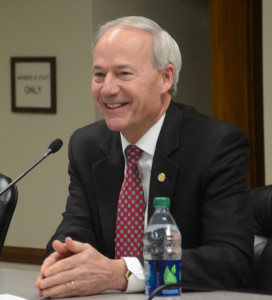 By Steve Brawner
By Steve Brawner
© 2015 by Steve Brawner Communications, Inc.
Arkansas’ state government was designed to have a weak governor, and that tradition has continued. The framers of the current 1874 Constitution ensured a veto could be overridden by a simple majority vote, and later amendments, such as the one that transferred the governor’s authority to the lieutenant governor when the governor leaves the state, have continued that tradition.
Gov. Asa Hutchinson pretty much took a sledgehammer to all of that during this recent legislative session.
On issue after issue, the Legislature gave him whatever he wanted. He wanted a middle class tax cut. It passed. He wanted to buy time on the Medicaid private option, so he asked legislators to extend it for two years while they study what to do with it. Even those who campaigned on an over-my-dead-body platform said yes. When the House Committee on Public Transportation advanced a bill transferring part of general revenues to highways, Hutchinson said it didn’t fit into his budget, so the sponsor killed it, though with a promise from Hutchinson to appoint a task force to study highway funding.
Then there were the constitutional amendments. Legislative leaders indicated they didn’t really care to refer any of those to the voters, so the process looked dead in its tracks. Then Hutchinson said he wanted two – one to end the aforementioned practice of giving up his powers to the lieutenant governor, and one to increase the fund Arkansas uses to attract economic superprojects like auto plants. Both now will be on the ballot in 2016.
How did a system designed to produce a weak governor instead produce an orchestra conductor like Hutchinson? One explanation is that he displayed extraordinary political skills this session. He took potential train wrecks like the private option and Common Core off the table by appointing task forces to study them, and when all heck broke loose with the Religious Freedom Restoration Act, he charted a middle ground that made him a hero to both sides even though he originally supported the bill.
History also was on his side. Hutchinson is the first Republican governor to hold office with a Legislature controlled by Republicans since shortly after the Civil War. His party wanted to govern effectively rather than look like the dog that caught the car and didn’t know what to do with it.
Hutchinson had another explanation during a sit-down session with reporters in his office last Thursday.
“The strength of the governor is from the respect of the office and the recognition that we need to have a leader, and also the desire to have the governor succeed,” he said. “And so that’s impressed me, and that’ s not a Republican thing. That’s a Republican and a Democrat thing. Democrats who opposed me, they not only said it, but they showed it in actions that it is important for Arkansas that the governor succeed.”
Contrast that attitude with this statement made by Sen. Mitch McConnell, R-Kentucky, now majority leader, during an interview with National Journal on Oct. 29, 2010: “The single most important thing we want to achieve is for President Obama to be a one-term president.”
Democrats often point to that statement. To be fair, according to the fact-checking site Politifact, he said it in the context of discussing historical elections and said in that same interview that Republicans were willing to work with Obama “if he’s willing to meet us halfway.”
Still, Republicans’ priority from day one of Obama’s administration clearly has been to position themselves for future elections – just as Democrats in Washington will behave if a Republican presidential candidate manages to beat Hillary Clinton. The days when the president had a “honeymoon” after being elected may be just a fading memory.
Of course, it’s not the job of Democrats and Republicans to help each other succeed – particularly not in Washington, where the parties have real differences in their stated goals. But Washington could use more of Arkansas’ spirit, and Arkansas probably could use a little of Washington’s. Very little, but a little.
The latter will happen in Arkansas over the course of the next two years. Hard decisions on issues like the private option must be made, and legislators in both parties increasingly will challenge the governor.
It will get tougher for Hutchinson, just as it did for previous governors after they had been in office for a while. Unlike in Washington, most legislators still will want him to succeed, but eventually the honeymoon will be over.